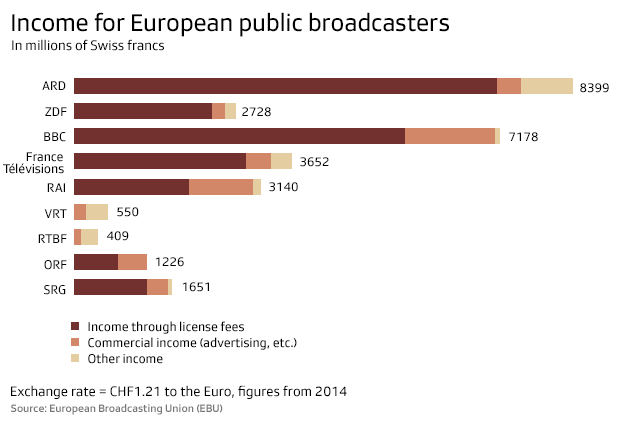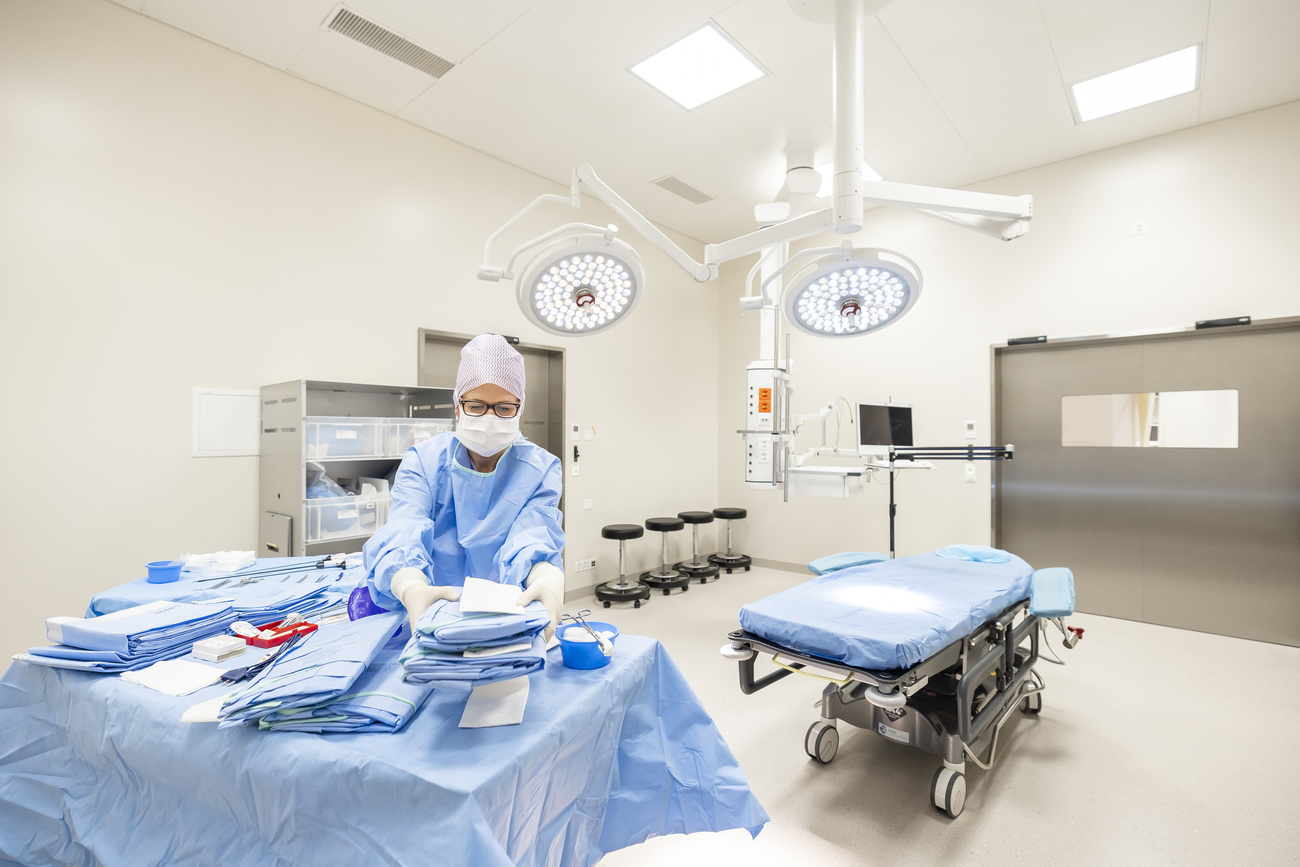What’s the price of public broadcasting in Switzerland?

Parliament is continuing its debate of a people’s initiative which aims to scrap licence fees for the services of the public Swiss Broadcasting Corporation (SBC). At stake is the value of information in a direct democracy and an annual per capita fee of up to CHF451 ($471).
What is the fee for?
The SBC, swissinfo.ch’s parent company, is funded by licence fees (75%) and income from advertising (25%). Swiss residents who receive radio or television services must pay licence fees, regardless of which programmes they watch or listen to, and no matter how they watch or listen (terrestrial, cable, satellite, via the phone line, on their mobile phone or via the internet).
The fee amounts to 0.74% of an average income in Switzerland (CHF61,152): of the annual CH451 fee, CHF165 is used for radio and CHF286 goes towards television.
Where does the money go?
The SBC has an annual turnover of CHF1.6 billion which is mainly used to operate 17 radio and television channels in four national languages (German, French, Italian and Romansh). Part of the revenue also goes towards private radio and TV stations with a public service role.
Is the SBC a state-run broadcaster?
No, the SBC is neither an official state broadcaster nor does it have a legal charter similar to the British Broadcasting Corporation (BBC).
The SBC is independent in its editorial policy. The reason being that the organisation was set up as an association more than 80 years ago, and the structure has remained unchanged.
Originally, the SBC was made up of groups of amateur craftsmen and ham radio enthusiasts. This is why the SBC is not funded directly through taxes. Back in 1931, the local associations introduced radio in Switzerland and laid the foundations for the SBC.
The “No Billag” initiative aroused lively debate in the House of Representatives on Thursday. The largest political group, the Swiss People’s Party, took aim at the cost and content of the Swiss Broadcasting Corporation (SBC), accusing it of wasting public money by diffusing American TV series and stifling competition from private media. The rightwing party put forward a counter-proposal demanding licence fees be reduced by half to CHF200.
All the other political parties were against the dismantling of the SBC, citing its role in supporting cultural and linguistic diversity in the Swiss media landscape. They were also against the proposal to halve the current licence fee as it would take a heavy toll on the SBC.
There were calls for a reduction in advertisements and a cap on the amount the public broadcaster receives through the licence fee. The debate will continue on September 25.
Why is the initiative known as ‘No Billag’?
The company charged with billing consumers for the use of SBC’s broadcasting services is named Billag. Hence also the Billag fee. Opponents who consider the fee as an undue compulsory levy imposed on citizens want to scrap the Billag fee.
A people’s initiative was launched three years ago and succeeded in collecting enough signatures to force a nationwide vote. The campaigners argue the fee violates the freedom of media choice of citizens because they pay a fee regardless of their media consumption.
However, the SBC director general has described the initiative as an attack on public service broadcasters. He maintains that an approval of the initiative would mean the end of the SBC.
What do the parliamentarians say about it?
A majority of the members in the House of Representatives are convinced that the licence fees are crucial for solid basic information and programmes in Switzerland’s four language regions, providing a public service.
The Senate threw out the initiative earlier this year and recommended voters do likewise in a nationwide vote. The other parliamentary chamber, the House of Representatives, is discussing the issue during the current autumn session. It has also tabled a proposal about whether voters should be given a choice between the initiative and a counter-proposal.
Most parliamentarians – with the exception of a few members from the political right – agree that the current system is best suited for Switzerland, also in the future.
Supporters, notably members of the Senate, say the system with licence fees is key for national cohesion and to allow citizens form their own opinion in a direct democracy with regular nationwide votes on a wide range of issues.
The bone of contention in the debate is the price of the licence fee and what services the SBC has to provide.
Voters are likely to have the final say on the issue next year.
What’s this got to do with you?
SWI swissinfo.ch – the news platform that you are reading at the moment – is the international arm of the SBC and publishes content in ten languages.

Adapted from German by Urs Geiser

In compliance with the JTI standards
More: SWI swissinfo.ch certified by the Journalism Trust Initiative









You can find an overview of ongoing debates with our journalists here . Please join us!
If you want to start a conversation about a topic raised in this article or want to report factual errors, email us at english@swissinfo.ch.